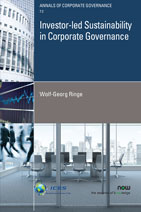Investor-Led Sustainability in Corporate Governance
By Wolf-Georg Ringe, Professor of Law and Finance and Director of the Institute of Law and Economics, University of Hamburg, Germany, and Visiting Professor of Law, University of Oxford, UK, georg.ringe@uni-hamburg.de
Abstract
The transition to a sustainable economy currently involves a fundamental transformation of our capital markets. Lawmakers, in an attempt to overcome this challenge, frequently seek to prescribe and regulate how firms may address environmental, social, and governance (ESG) concerns by formulating conduct standards. Deviating from this conceptual starting point, the present study makes the case for another path towards achieving greater sustainability in capital markets, namely through the empowerment of investors.
This trust in the market itself is grounded in various recent developments both on the supply side and the demand side of financial markets, and also in the increasing tendency of institutional investors to engage in common ownership. The need to build coalitions among different types of asset managers or institutional investors, and to convince fellow investors of a given initiative, can then act as an in-built filter helping to overcome the pursuit of idiosyncratic motives and supporting only those campaigns that are seconded by a majority of investors. In particular, institutionalized investor platforms have emerged over recent years as a force for investor empowerment, serving to coordinate investor campaigns and to share the costs of engagement.
ESG engagement has the potential to become a very powerful driver towards a more sustainability-oriented future. Indeed, I show that investor-led sustainability has many advantages compared to a more prescriptive, regulatory approach where legislatures are in the driver’s seat. For example, a focus on investor-led priorities would follow a more flexible and dynamic pattern rather than complying with inflexible pre-defined criteria. Moreover, investor-promoted assessments are not likely to impair welfare creation in the same way as ill-defined legal standards; they will also not trigger regulatory arbitrage and would avoid deadlock situations in corporate decision-making. Any regulatory activity should then be limited to a facilitative and supportive role.
Investor-Led Sustainability in Corporate Governance
Investor-led Sustainability in Corporate Governance argues that ESG engagement can be a very powerful driver towards a more sustainability-oriented future in corporate governance. Investor-led sustainability has many advantages compared to a more prescriptive, regulatory approach. For example, a greater focus on investor initiatives would follow a more flexible and dynamic pattern rather than complying with pre-defined criteria that are slow to change. Moreover, investor-promoted assessments are not likely to impair welfare creation in the same way as ill-defined legal standards; they would also not trigger regulatory arbitrage and would avoid deadlock situations in corporate decision-making. Any regulatory responses should then be limited to a facilitative and supportive role.
This monograph proceeds as follows: Section 2 traces the recent trend towards increased ESG and sustainability in corporate governance and finance, and in particular documents the rise of investor-led initiatives in this field. Section 3 discusses the merits of such shareholder engagement and makes the case that ESG initiatives pursued by investors are consistent with business realities and conform with market logic of both demand and supply. Section 4 turns to the main advantage of ESG engagement, namely that it increasingly relies on coalitions and team-building between different types of institutional investors. It is presented that these teaming-up strategies have a dual benefit and a double genius in that they give greater support to campaigns, but also serve as an in-built screening mechanism that would exclude the realization of idiosyncratic benefits for individual investors. Sections 5 and 6 develop some regulatory implications and conclude the analysis.
